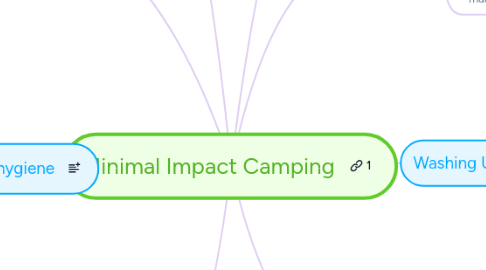Minimal Impact Camping
Sean Gibbにより

1. Toilets
1.1. Dispose of feminine products in a plastic sanitary bag
1.2. At least 60 m from water
1.3. Dig a 15cm deep hole for number 2
1.4. Use biodegradable toilet paper
1.5. Go downstream
1.5.1. Be at one with nature
2. Personal hygiene
2.1. Natural toothpaste. do not go and buy a new special toothpaste just for this trip!
2.2. Use hand sanitizer rather than soap
2.3. Do not take baths with soap in lakes/rivers, unless soap is natural
2.4. If critical, use biodegradable tampons used for camping, or don't dispose them in the environment - bring them home
2.5. Left hand wipes, right hand is for eating
2.6. Do not bring cosmetics or perfume, unless its natural - e.g. lavender
3. Stay on track
3.1. Follow the route card
3.2. don't destroy anything off track
3.3. Make sure to have a compass and map as a reference to where to go, it will help when you get lost as well
4. Rubbish
4.1. Take all rubbish with you unless it is biodegradable (apple cores etc)
4.2. take plastic bags to keep the trash in and take home to dispose properly
4.3. use zero waste alternatives!
4.4. Bring a bag to put all your rubbish because you should not leave it at the campsite
5. Washing Up
5.1. Take natural washing up liquid
5.2. Wash 50 - 100 m away from the main water source, eg. main stream, when using soap
5.3. Don't let plates or cutlery float away when doing the dishes
5.4. Wash dishes downstream so that upstream can be used for drinking water and wont be dirty
5.5. Minimalise use of detergents
6. Flora & Fauna
6.1. Stay on path
6.2. Do not pick lots of plants, FORGET THAT DO NOT PICK ANY PLANTS
6.3. Don't scare wildlife
6.4. Do not feed wildlife
6.5. Do not let wildlife scare you
6.6. Leave the campsite as you found it
6.7. Try not to be very loud
7. Fires
7.1. Try to avoid fires
7.2. Keep fires small
7.3. make a fire in an already existing fireplace
8. Additional Sources
8.1. https://www.forestrytas.com.au/assets/0000/0105/camping_caring.pdf


